Kategorie: ‘Energie und Umwelt’
BMBF supports “SPEED” project by Dr Weihan Li
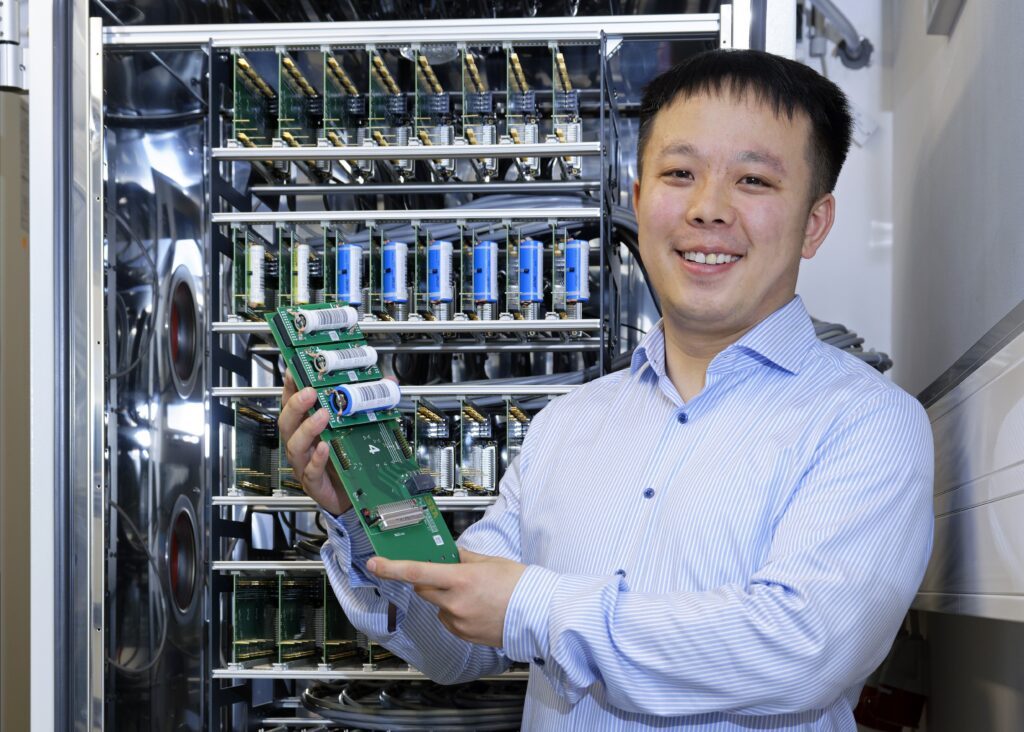
Dr. Weihan Li © Peter Winandy
The German Federal Ministry of Education and Research (BMBF) is funding Dr Weihan Li’s project “SPEED” – Rapid characterisation of the performance of lithium-ion batteries from the production line using machine learning” with 1.85 million euros over the next five years as part of its “BattFutur – Young Investigators Group Battery Research” competition.
At the Center for Ageing, Reliability and Lifetime Prediction of Electrochemical and Power Electronic Systems (CARL) at RWTH Aachen University, the junior research group ‘Artificial Intelligence for Batteries’ is pioneering the development of approaches to automate, digitalise, and accelerate the evaluation of battery performance from production lines using machine learning.
The ‘BattFutur’ funding initiative is part of the ‘Battery Research Factory’ concept, which is embedded in the ‘From Material to Innovation’ framework programme. This programme is a central pillar of the German government’s high-tech strategy. To attract excellent scientists in the field of battery technology to German science and industry, optimal starting conditions must be created. Therefore, promoting young scientists is essential.
Dr Weihan Li has led his junior research group since graduating with honours in Electrical Engineering and Information Technology from RWTH Aachen University in 2021. He completed his Master’s degree in Automotive Engineering and Transportation at RWTH in 2017, after earning his Bachelor’s degree in Automotive Engineering at Tongji University in 2014. Throughout his academic career, Dr Li has conducted research at esteemed institutions such as Imperial College London, the University of Oxford, and the Massachusetts Institute of Technology. He has received numerous awards, including the German Study Prize of the Körber Foundation, the Reichart Prize of the Akademie Gemeinnütziger Wissenschaften zu Erfurt, the vgbe Innovation Prize, the RWTH Innovation Prize, and the Battery Young Research Award.
Institute for Power Electronics and Electrical Drives (ISEA)
Otto Junker Prize Award 2023
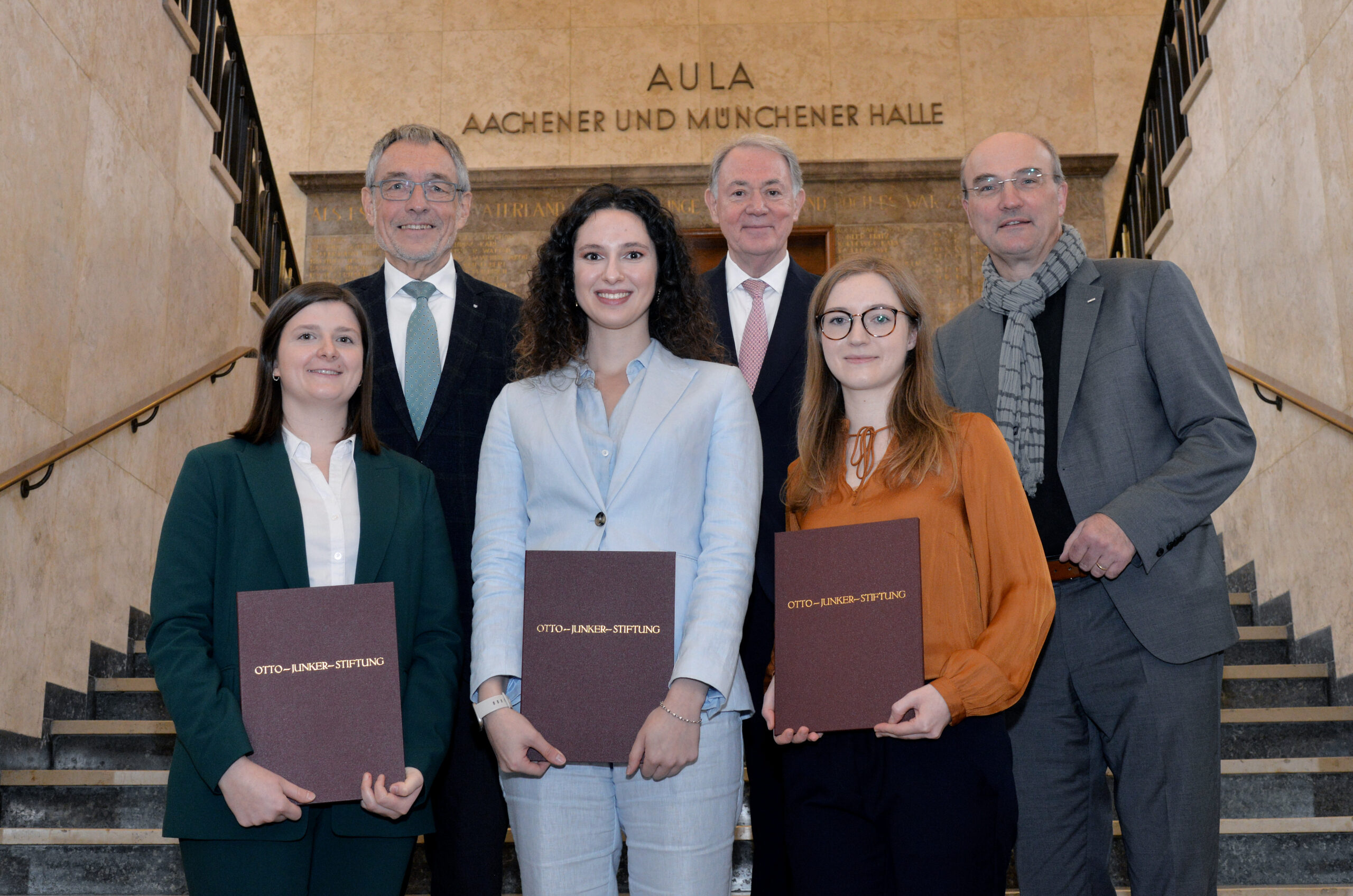
In front, from left: Prizewinners Lina Fischer, Alba Clemente Sánchez and Kathrina Theisen. At the back, from left: Wolfgang Bleck, Udo von Berg and Ulrich Rüdiger.
Lina Fischer, a doctoral student at the Chair of Transmission Networks and Energy Economics at the IAEW, is one of three winners of the Otto Junker Prize for excellent academic performance.
The Otto Junker Prizes were recently awarded to three impressive graduates of RWTH Aachen University in a festive ceremony. Lina Fischer, Alba Clemente Sánchez and Kathrina Theisen were honored for their outstanding academic achievements.
The awards, named after the founder of the Otto Junker Foundation, Dr. Otto Junker, are presented annually to exceptional graduates of the Faculty of Electrical Engineering and Information Technology and the Materials Science and Engineering Group in the Faculty of Georesources and Materials Engineering. The foundation, established in 1970, is dedicated to promoting young scientists and supports numerous individual projects.
The award ceremony took place during a festive event at which Udo vom Berg, Chairman of the Otto Junker Foundation, and RWTH Rector Ulrich Rüdiger personally presented the awards. Professor emeritus Wolfgang Bleck, Chairman of the Foundation’s Scientific Advisory Board, joined in the congratulations.
Lina Fischer, born in Bruchsal in 1998, enrolled for a Bachelor’s degree in Industrial Engineering and Management with a specialization in Electrical Power Engineering at RWTH Aachen University after graduating from high school. She completed her Master’s degree with a thesis on “The impact of flexible consumers on market pricing in a renewable electricity supply system” at the Chair of Transmission Networks and Energy Economics under the supervision of Professor Albert Moser. Since the beginning of 2023, Fischer has been working on his doctorate at the RWTH Institute for Electrical Systems and Grids, Digitization and Energy Economics.
Alba Clemente Sánchez impressed the jury with her master’s thesis on the development of a digital twin for the optimization and online control of a continuous steel casting process. Kathrina Theisen was honored for her master’s thesis entitled: “Design investigations for glass tank simulation”.
The impressive achievements of these three graduates not only underline their individual excellence, but also honor RWTH Aachen University as an educational institution for brilliant personalities. We congratulate Lina Fischer, Alba Clemente Sánchez and Kathrina Theisen on this well-deserved recognition and wish them continued success on their promising career paths.
“Accure” and “Cylib” win the NRW Innovation Award 2023
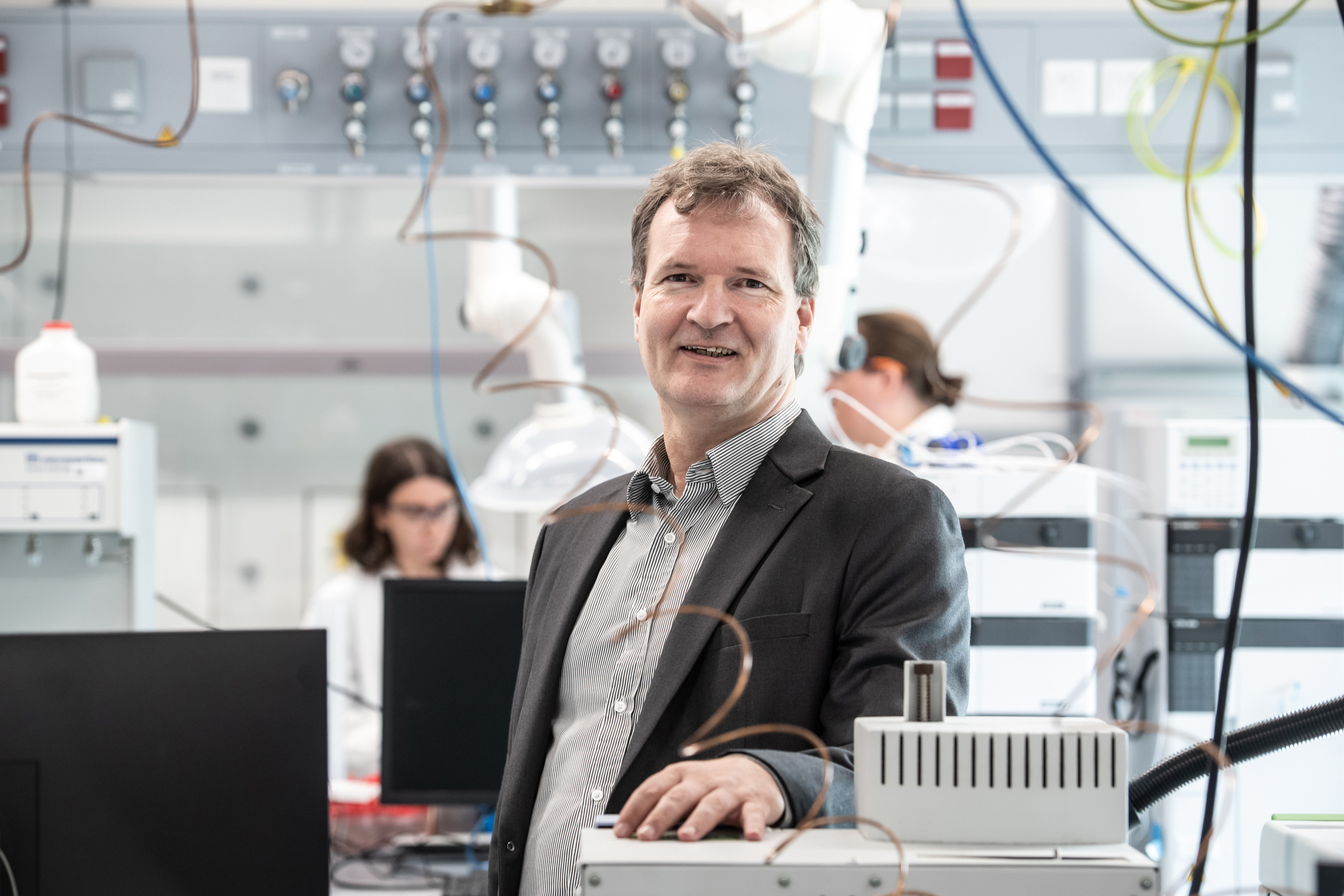
Professor Dirk Uwe Sauer © Heike Lachmann
Innovative technologies and sustainable solutions in focus: RWTH start-ups make their mark in the fight against climate change.
The NRW 2023 Innovation Award has put the spotlight on two outstanding RWTH spin-offs: “Accure” and “Cylib”. These two start-ups not only have their roots at RWTH Aachen University, but also share a common mission – to fight rising temperatures and the associated challenges of climate change.
“Accure” was founded in 2020 by Dr. Kai-Philipp Kairies, Dr. Georg Angenendt and Dr. Johannes Palmerist and emerged from the Chair of Electrochemical Energy Conversion and Storage Systems Technology headed by Professor Dirk Uwe Sauer. Dirk Uwe Sauer and co-founder Kai-Philipp Kairies accepted the NRW 2023 Innovation Award in the “innovation2business” category in Düsseldorf. This award recognizes individuals who have developed successful business models from outstanding ideas.
The start-up specializes in monitoring the performance, safety and lifetime of batteries based on big data and the use of artificial intelligence (AI). Such an innovative approach is crucial for the introduction of sustainable energy storage solutions. Dirk Uwe Sauer emphasizes the need to transfer scientific findings to the business world in order to have a positive impact on society. This is exactly what “Accure” has successfully achieved.
“This honor means a lot to us,” says Sauer, “because we are standing up for changing things with our research.”
The award in the “innovation2business” category comes with prize money of 50,000 euros, which will be earmarked for further research purposes.
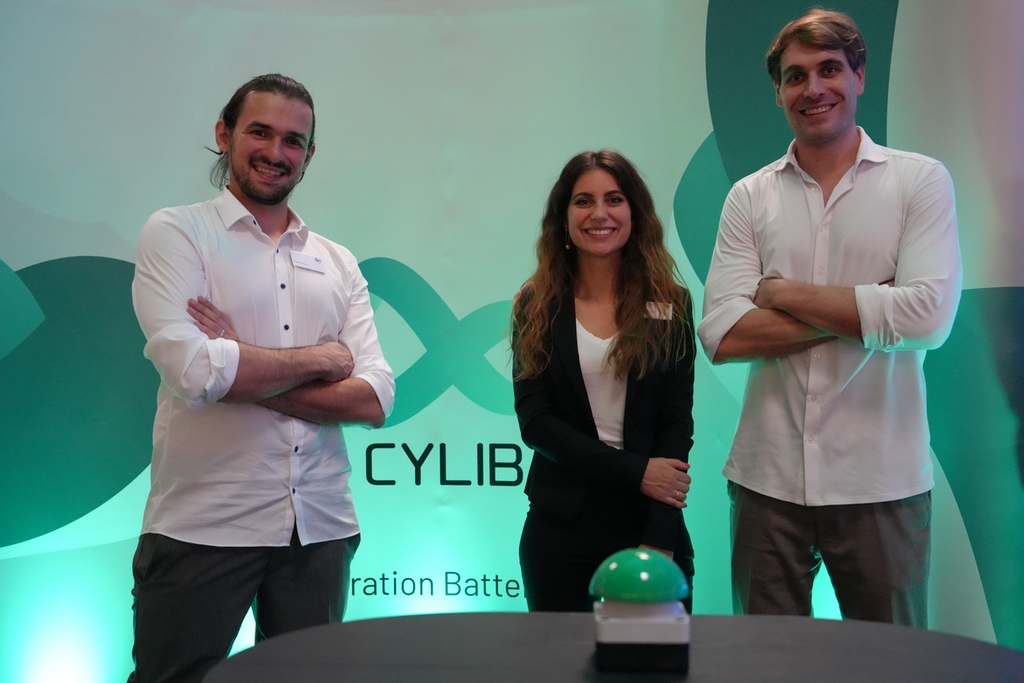
The founders of “Cylib”, Paul Sabarny, Lilian Schwich, Dr. Gideon Schwich from left © Anna Wawra
The evening was even more exciting than for “Accure” for Lilian Schwich, one of the three founders of “Cylib”. While “Accure” had already been determined as the award winner before the event, Lilian Schwich had to compete against two other nominees in the “innovation4transformation” category on Monday evening.
The start-up, which she founded together with her husband Dr. Gideon Schwich and Paul Sabarny, has spent years developing a process at RWTH Aachen University to recycle all the components of a lithium-ion battery. The goal is to recover all components and thus close the gap in the circular economy. This approach is not only more effective, but also more environmentally friendly compared to the current state of the art.
“The award is also a recognition for the long hard time of research,” said Lilian Schwich, “with research we spent many hours, days, weeks, weekends.”
The audience award “innovation4transformation” is given to personalities whose innovative products, solutions or business models contribute in an outstanding way to solving transformation challenges. This category is endowed with 25,000 euros and recognizes the contribution of “Cylib” to the circular economy and environmental protection.
Both awards underscore the important role of RWTH spin-offs in developing innovative solutions to the pressing challenges of the 21st century, particularly in the fight against climate change. With their groundbreaking technologies and sustainable approaches, they are pioneers on the path to a more environmentally friendly and sustainable society.
For more insights, watch the interview and video with Professor Dirk Uwe Sauer and the interview with Lilian Schwich.
Writing Workshop E-Technology Winter Semester 2023/24

© Martin Braun
You are studying a bachelor or master subject at the Faculty of Electrical Engineering and Information Technology? The study or final thesis is now imminent? Then get the support of the Language Center and benefit twice!
The semester course in presence strengthens the subject-specific writing and text competence with customized writing advice. Practical workshops based on text examples from electrical engineering and information technology provide know-how on text structure, language, style and citation. The online expert feedback in the writing consultation helps to individually apply what has been learned in the course to the current project or thesis. Voluntary participation in an introductory course on technical subject research at the University Library is also offered as part of the course.
After successful participation, the Language Center awards a certificate and 3 CP, which are creditable according to the respective examination regulations.
International students must prove a German language level of at least C1.2 as a prerequisite for participation in the course.
Registration takes place via the user account at the Language Center.
Registration deadline: September 29 – October 10, 2023
Dates:
| Group 1 02.54478 |
Group 2 02.54479 |
|
Wed, 08.11.2023 Wed, 22.11.2023 Wed, 06.12.2023 Wed, 10.01.2024 each from 09.00 to 12.00 hrs |
Wed, 15.11.2023 Wed, 29.11.2023 Wed, 13.12.2023 Wed, 17.01.2024 each from 09.00 to 12.00 hrs |
Contact for queries: schreibzentrum@sz.rwth-aachen.de
First RWTH GreenTech Late Night at Theater Aachen
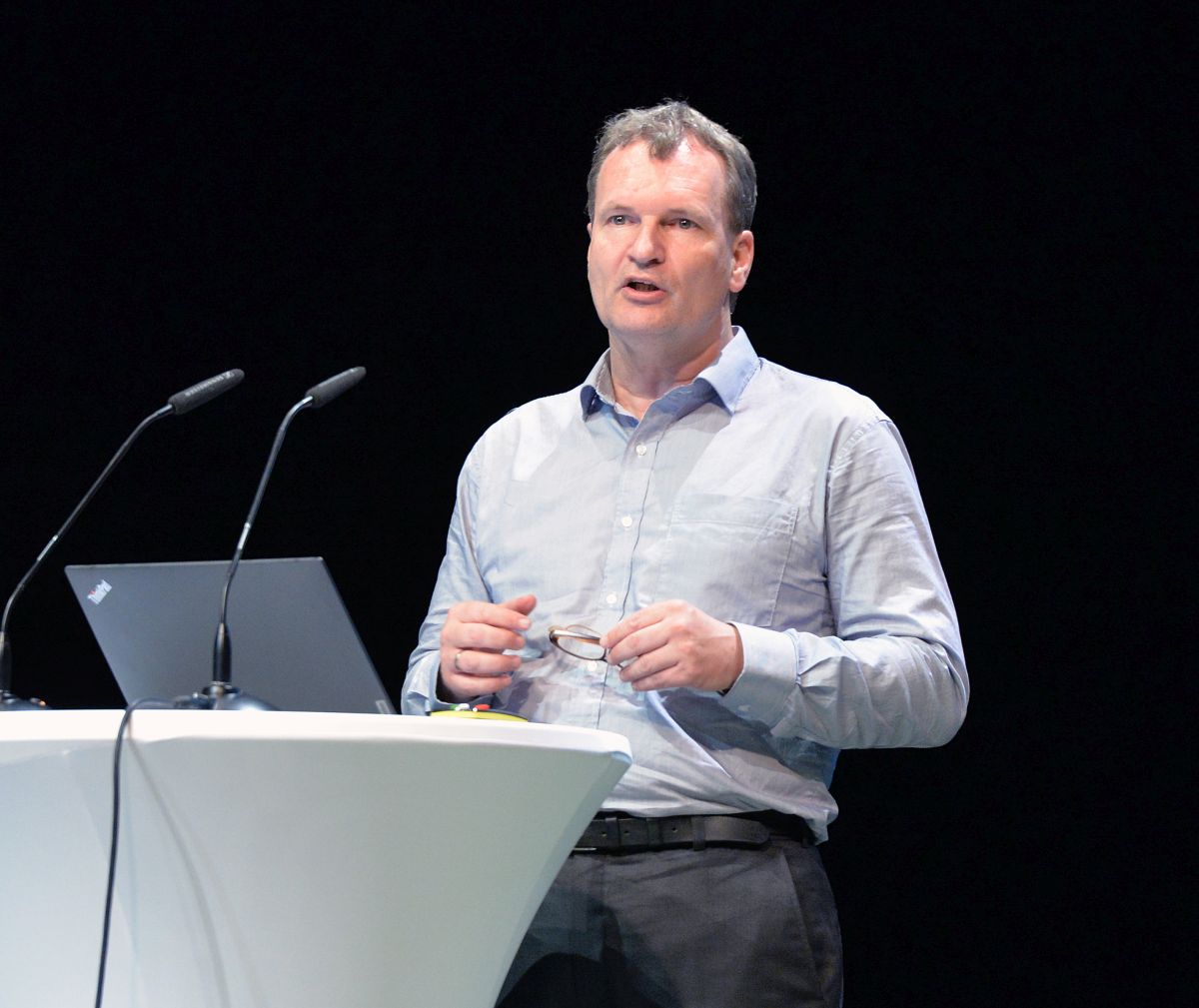
RWTH professor Dirk Uwe Sauer argues the view of science ©Andreas Schmitter
At the birth of a platform of engagement and exchange, the RWTH GreenTech Late Night, the academic world was in the spotlight at Theater Aachen on June 19, 2023. Represented by RWTH professors Kai-Uwe Schröder and Prof. Dirk Uwe Sauer, the science perspective took a starring role, conveying how essential it is to actively communicate scientific findings about climate change and the underlying technologies to the broader society in order to raise awareness and promote collective action to combat climate change. In this regard, dialogue between research, technology and policy is essential at a time of fundamental change and transformation.
“I think the initiative for the event is very good. We need much more communication out of science into society in these times of fundamental upheaval,” sums up Professor Dirk Uwe Sauer, battery expert at RWTH Aachen University.
The first RWTH GreenTech Late Night at Theater Aachen was an unprecedented event that bridged the boundaries between science, technology and society. In the process, the theater became a vibrant arena of knowledge exchange, bringing together experts, visionaries and creatives to discuss the most pressing challenges in the field of climate protection.
This extraordinary event offered a multi-faceted program ranging from keynote speeches and interviews to artistic readings and cabaret interludes. The variety of formats painted a comprehensive picture of the complex topic while emphasizing the vibrancy and dynamism of academia.
The RWTH GreenTech Late Night impressively demonstrated how innovation and knowledge transfer can be driven forward in times of climate change. The event encouraged finding new ways of collaboration between science, technology, politics and culture to jointly shape a sustainable path into the future. This platform will undoubtedly continue to play an important role in shaping the global climate agenda.
Detailed information about the event’s schedule and guests is available at GreenTech Late Night – To Solve the Climate Crisis, You Need Both an Ear for Science and a Commitment to it.
Voices from the GreenTech Late Night reflect the opinions of the guests, who deal with the climate crisis and possible ways out in their own way.
The Reichart Prize 2023 goes to Dr.-Ing. Weihan Li
Prof. Frank Hellwig and Prof. Peter Scharff award Dr. Weihan Li the Reichart Prize 2023 © Mathias Brösicke
A remarkable contribution to application-oriented science was honored when Dr.-Ing. Weihan Li received the coveted Reichart Prize on June 24, 2023. The junior research group leader at the Center for Ageing, Reliability and Lifetime Prediction for Electrochemical and Power Electronics Systems (CARL) at RWTH Aachen University was recognized for his pioneering work in digitizing battery use with a digital twin. This innovative approach aims to provide greater clarity on battery aging processes, safety and reliability.
Named after Christian Reichart, a versatile Erfurt resident, the prize awarded annually highlights outstanding graduate work in various scientific fields. The cooperation between the state capital of Erfurt, the University of Erfurt and the University of Applied Sciences in Erfurt ensures that this prize promotes talented young scientists whose work has a clear link to applicability. In doing so, it honors the legacy and vision of Christian Reichart, who already distinguished himself in the 18th century as a pioneer of interdisciplinary research and non-profit applications. The award committee, consisting of representatives from these institutions, selects the winners and acknowledges promising research approaches with prize money of 2,000 euros and strengthens interdisciplinary exchange. This award underlines the importance of using scientific findings for the benefit of society and building bridges between different disciplines to create practical solutions to current challenges.
More about the Reichert Prize can be found on the website of the Academy of Erfurt.
CO2For-IT: A data room for the timber industry with a focus on climate protection
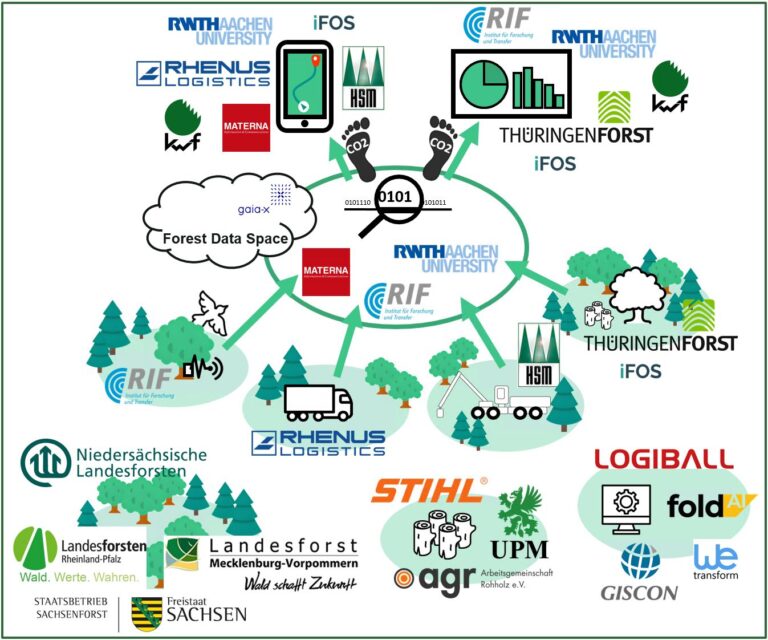
Project partners in CO2For-IT. © Institute for Man-Machine Interaction RWTH Aachen University
A new initiative to promote a climate-friendly timber industry was launched in July 2023. The CO2For-IT project, supported by the Federal Ministry of Economics and Climate Protection, aims to create a “Forest Data Space” to enable the sustainable use of wood from forests.
The Forest Data Space will provide data on the carbon footprint of the entire timber value chain and therefore support the development of data-based solutions for climate protection. The project is led by Materna Information & Communications SE and coordinated by the Dortmund Institute for Research and Transfer (RIF e.V.). Other partners include RWTH Aachen University, Rhenus Forest Logistics GmbH & Co. KG, HSM Hohenloher Spezial Maschinenbau GmbH & Co. KG, Forstliches Forschungs- und Kompetenzzentrum Gotha (ThüringenForst – AöR) and Kuratorium für Waldarbeit und Forsttechnik e. V. (KWF). In addition, foldAI and iFOS GmbH are collaborating with the project.
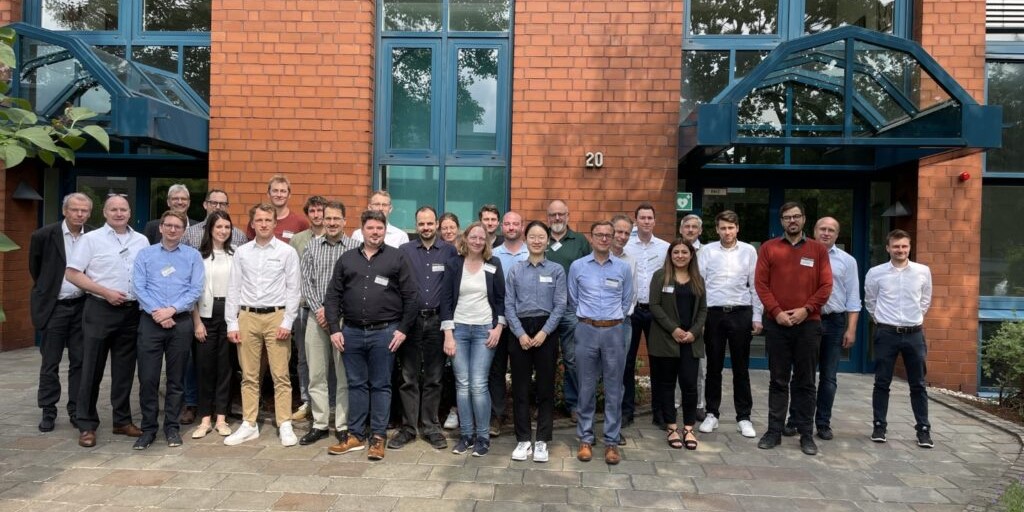
© Institute for Man-Machine Interaction RWTH Aachen University
For more information visit: KWH 4.0 | CO2For-IT (kwh40.de) (only in german)
Energy Park Herzogenrath: Chair of Electrochemical Energy Conversion and Storage Systems is involved in research
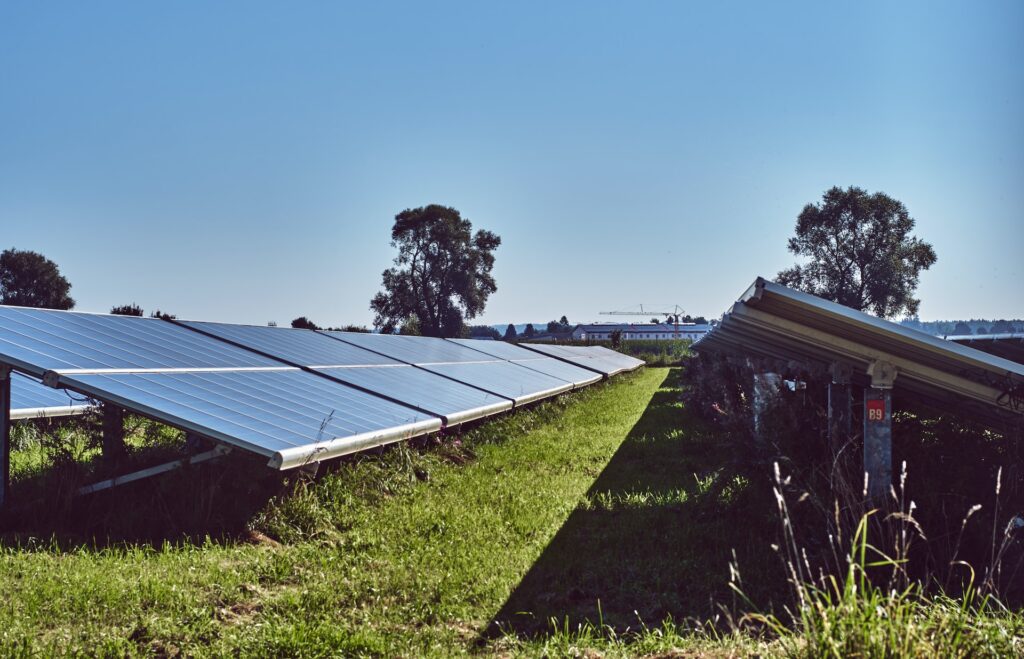
© Michael Förtsch by Unsplash
The project for CO2-neutral energy supply in Herzogenrath, the first city in NRW to strive for this goal, is accompanied by a consortium of four chairs and institutes, including the Chair of Electrochemical Energy Conversion and Storage Systems Technology.
Herzogenrath wants to achieve CO2-neutral energy supply by 2030. A consortium of Siemens Energy, RWTH Aachen University, Aachen University of Applied Sciences and the Niederrhein University of Applied Sciences is conducting research on the project “Energy Park Herzogenrath Research & Development”, which is funded by the Federal Ministry of Economics and Climate Protection with 2.7 million euros. The project is also closely interlinked with other ongoing research and funding projects: at the local flat glass manufacturer Saint Gobain, CO2-free production is being researched, in which the Chair of Electrochemical Energy Conversion and Storage Systems Technology at the E.ON Energy Research Center (ERC) of RWTH Aachen University is involved. The aim is to recycle the heat generated during glass production in Herzogenrath and Kerkrade in the Netherlands as green heating energy.
The project uses a digital twin that virtually maps and simulates the energy supply. In this way, different scenarios can be tested and optimised. The project looks at generation, consumption and marketing options across sectors. RWTH is receiving around 918,000 euros in funding for this.
More information on the project can be found at Energiepark Herzogenrath – Strukturwandel Rheinisches Revier (revier-gestalten.nrw) and at CO2-neutral bis 2030: Forschungsprojekt Energiepark Herzogenrath mit rund 2,7 Millionen Euro gefördert | Wirtschaft NRW.
Climate protection through electrical engineering – Professor Dirk Uwe Sauer’s lecture at the Children’s University
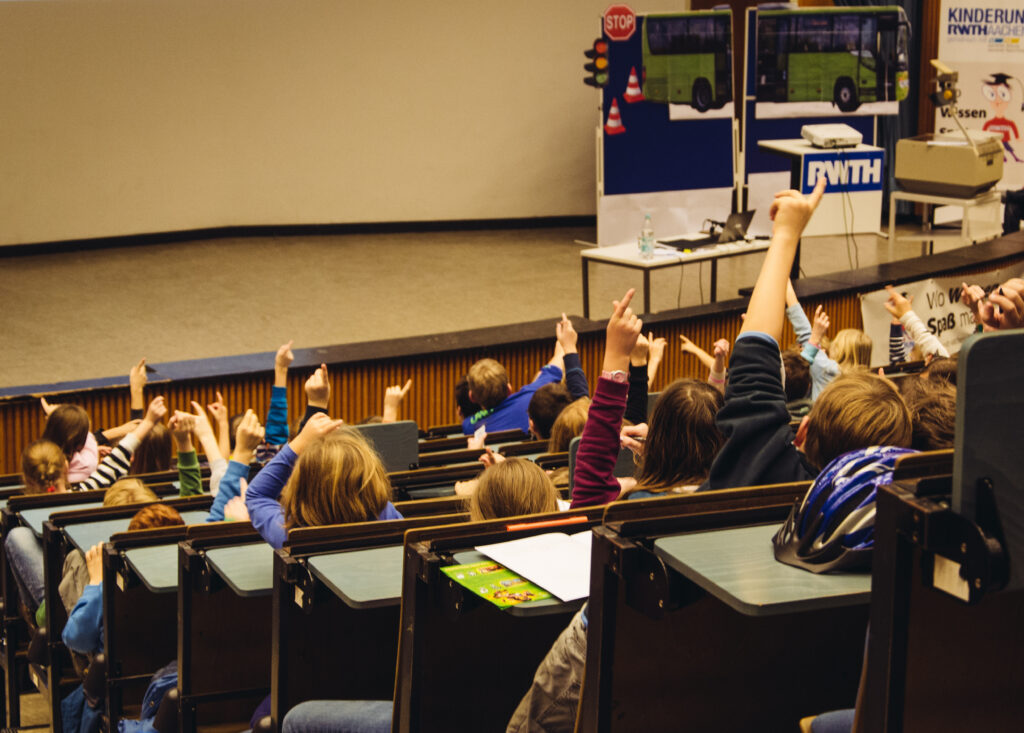
Kinder im Hörsaal. ©RWTH Aachen University
Whether drought, floods or forest fires – the consequences of global warming are dramatic for nature and people. The countries of the global south are being hit particularly hard, but the effects are also being felt here. We experienced this at the latest with the devastating floods in July 2021. That is why we urgently need to address the issue of climate change.
This is also what Dirk Uwe Sauer, Professor of Electrochemical Energy Conversion and Storage Systems Technology at RWTH Aachen University, is doing. He has been researching new energy systems for over 30 years and advises politicians on the energy transition.
„We see in all places that climate change is happening – with many negative consequences. And we urgently need a radical change in the way we have supplied ourselves with energy so far.“
This does not only affect us adults, but especially the children and young people of today. They will have to live with the limitations that climate change will bring. “I don’t think we should underestimate what children know and what they are capable of,” says Professor Sauer.
It is not too late to make a difference
In his lecture, the physicist not only explained the dangers of climate change, but also made the necessary changes understandable. He used various materials such as videos, slides and interactive presentations to show the physical basics and the possibilities through timely action: “I also want to spread optimism and show that things can also get better than they currently are. Because if we still grab the wheel in time, then we still have the possibility to avoid worse things.” For this to happen, however, society must overcome its fear of new technologies. The professor said that there is too much talk about the risks instead of seeing the opportunities. “And we simply can’t afford that now either.” A ruling by the Federal Constitutional Court in 2021 has obliged politicians, and thus the population, to act more quickly. The slower progress is made, the more the living conditions of the next generations are restricted. That is why the previous federal government tightened the climate protection targets and the Climate Protection Act. “We have the opportunity to achieve these goals. We have the necessary technologies to supply all eight billion people in the world properly with renewable energy,” Sauer said.
Climate change is an important issue that concerns us all. But what does it actually mean and how can we work against it? Professor Sauer explained this to the children in his lecture at the Children’s University on 16 June 2023. He showed them how the earth is warming up and what consequences this has for nature and people. He also presented solutions on how we can protect the climate with renewable energies and new technologies. For example, with solar cells that generate electricity from sunlight, or with electric cars that emit no exhaust gases. Professor Sauer showed the children not only the problems of climate change, but also the opportunities that arise from it. He showed them that we can not only influence the climate with our energy supply, but also promote biodiversity.
„I would like to show the children that, for example, large photovoltaic systems on open fields not only generate electricity, but also create space for extensive agriculture, for insects that can live and flourish in these areas again.“
Climate change is a major challenge that we can only overcome together. For this, we need an awareness of the connections between energy and the environment that starts with children. Another goal of the Children’s University event was to get the children excited about scientific topics. “Physics has the great advantage that it can illustrate things very vividly and also show connections,” said Sauer. Using simple means, Professor Sauer showed where research starts and what possibilities can arise through technical progress.
Source: Aachener Zeitung, 16 June 2023
Excellent placement in global university ranking
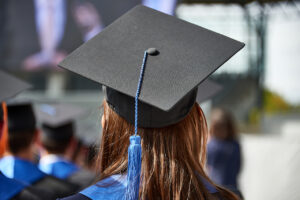
© Kurt Beyer
In electrical engineering, RWTH Aachen is one of the three best German universities. This is the result of the internationally highly regarded QS Ranking by Subjects of the British information service provider Quacquarelli Symonds. Presented in its latest version, the subject ranking is based on various criteria that are weighted according to subject. An online reputation survey among university graduates and employers accounts for between 40 and 100 percent of the total points and is considered the most important indicator. Citations, which scientific papers from universities receive on average, account for up to 60 percent. For some engineering and natural science subjects, international research networks are also taken into account.
The Aachen University of Excellence was able to place itself on the winner’s podium in many subjects throughout Germany and is also convincing in an international comparison. In ten subjects, it placed among the 100 best worldwide. RWTH did particularly well in the subjects of mining engineering with 15th place and mechanical engineering with 19th place.
For more information: www.topuniversities.com



